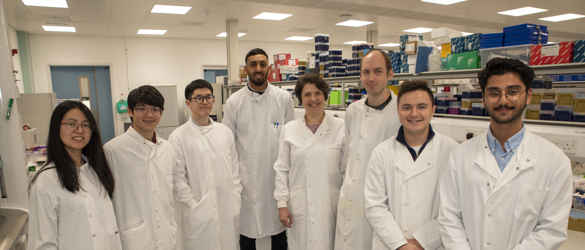How genetic mutations in ABCA4 cause sight loss

Professor Andrew Webster, Moorfields Eye Hospital - £109,432
August 2021 – February 2024
Our DNA contains genes that hold the information and instructions that determine how our cells develop and function. Some genes determine physical characteristics such as eye or hair colour, while others can influence the chance of developing a health condition.
One example is the ABCA4 gene, which is involved in a number of macular dystrophies, particularly Stargardt disease. Changes or ‘mutations’ to this ABCA4 gene can lead to developing a macular dystrophy. However, a lot of these changes are also seen in people without any sight loss. Professor Andrew Webster’s team at Moorfields Eye Hospital set out to understand why some people experience sight loss and others don’t, even with the same gene changes.
What’s the problem?
As the ABCA4 gene is very large and has a very long code, there are many points along the gene where mutations can occur. This leads to many different variants of the gene in the population, making it difficult to understand which changes lead to the different macular diseases.
Many variants that are seen in people with vision loss are also found in people without vision loss, including siblings with the same variants but where only one has a macular dystrophy. Therefore, it can be difficult to provide an accurate and correct genetic diagnosis.
What did the researchers do?
By analysing thousands of retinal scans from both the general population and those attending Moorfields Eye Hospital with a macular dystrophy, the researchers were able to compare the genetic variants of those without vision loss to those with vision loss.
What did the researchers find?
Having analysed data from tens of thousands of retinal scans from the general population, they found that just having one of the most common ABCA4 gene variants associated with macular dystrophy on its own is not enough to cause changes to the growth (thickness) of the person’s retina.
Additionally, they found the location of the ABCA4 mutations could influence whether or not someone will present symptoms of a macular dystrophy. They also highlighted that the effect of genetic variations for certain macular dystrophies were influenced by factors such as gender. For example, men were more likely to have the macular dystrophy known as Best disease. While this was the case for some dystrophies, others did not show gender imbalances.
Why is this important and what’s next?
Understanding how and why different genetic variants may or may not lead to macular dystrophies is vital. Research in this area will help understand and identify the factors involved in vision loss for those with the same ABCA4 variants.
This will help provide people with a correct genetic diagnosis that can provide more information about how the condition is likely to advance, and be targeted in future treatments. To understand this further, the team at Moorfields Eye Hospital outlined several avenues for future research, including further assessing the impact of gender and ethnicity on these genetic variances.
See our other projects
Since 1987 the Macular Society has invested around £10 million in over 100 research projects.
Explore more research
Beating macular disease through funding medical research and improving the lives of those living with macular disease.
Get the latest research news from the Macular Society
To hear about life-changing research and treatments, subscribe to our monthly enewsletter today. Together we can Beat Macular Disease.
Sign up to our free email newsletter



